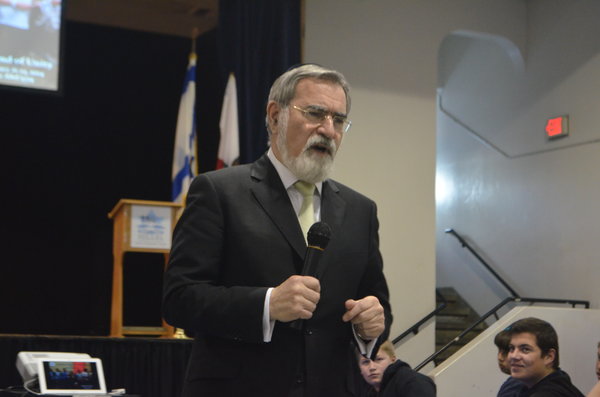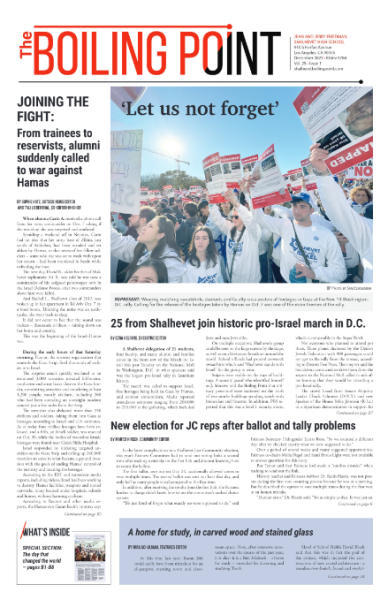A chosen people, but chosen for what? Rabbi Sacks answers

UNITE: Lord Rabbi Jonathan Sacks tells students to start focusing on the positives in Jewish life. He spoke at an L.A. synagogue and school on Feb. 20.
March 6, 2014
Jews were not chosen because they are superior to other nations, but rather because God wanted to show the world the dignity of difference, Rabbi Lord Jonathan Sacks said during a visit to Los Angeles last month.
Hundreds of people gathered in the main room of Young Israel of North Beverly Hills Feb. 20 to hear the former Chief Rabbi of England speak about engaging Jews in the diaspora.
But a highlight of his visit came after his prepared remarks were finished, when he answered questions from high school students including Shalhevet juniors Margo Feuer and Sigal Spitzer.
Margo asked whether Rabbi Sacks thought it was morally acceptable for people in one group to have, by birth, more inherent potential people from other groups.
The rabbi replied that all people have their chosen roles to play within the world.
The next day, Rabbi Sacks spoke to students from four schools at Harkham Hillel Hebrew Academy. Sigal asked him why the Jewish people were chosen.
Rabbi Sacks reiterated his points from the previous night and acknowledged the difficulty of the question.
“Judaism is God’s rejection of empire,” Rabbi Sacks said. “In an empire, everyone is expected to be the same.”
In his speech at Young Israel, Rabbi Sacks said Orthodox Jewry has solved the problem of retention – that is, Jews staying Jewish even in free societies.
“Within the next 25 years, Orthodoxy will dominate in America in a way it never has before,” Rabbi Sacks said.
But he noted that it had yet to attract the majority of secular Jews and said it was important to invite non-observant friends and family members to Friday night dinners, as opposed to just encouraging them to come to shul.
He also praised the Jewish day school movement and encouraged the ideas of tikkun olam and maintaining a positive outlook on Judaism.
At Hillel, Rabbi Sacks began the discussion by saying that when he first came to Los Angeles in 1968, only 25 percent of Jewish students were in Jewish day schools, compared to 70 percent today, he said.
Rabbi Steven Weil, executive vice president of the Orthodox Union, was the other speaker on the topic. Michael Medved, a renowned radio host and political commentator, moderated the discussion.
Rabbi Weil said that just 22 percent of Jews older than 65 years who were raised Orthodox remain Orthodox today, but that among 18 to 29 year olds, 83 percent do. Rabbi Weil credited day schools for the improved retention rate.
Rabbi Sacks also spoke about the Jewish activism and chesed (community service). He told the audience about the pride he felt when he heard that children of Holocaust survivors had created the Agahoza Youth Village in Rwanda to help victims of the genocide there.
“There have been many great films about how Jews die, but I want to see a film about how Jews live,” he said.
Rabbi Sacks also emphasized the importance of focusing on the positive. When Michael Medved asked how he felt about conflicts in the Orthodox world, Rabbi Sacks responded by saying that many supposed controversies are exaggerated so journalists and bloggers can gain a larger readership.
He went on to say that every synagogue in Los Angeles leads in a certain respect and it is important to have a variety of people in the Orthodox movement.
“People need to be focused on the positive,” he said.At Hillel, Shalhevet’s junior class was invited joined by students from Yeshiva High Tech, YULA Boys’ School, and YULA Girls School, as well as Hillel eighth-graders.
Rabbi Sacks gave a brief dvar Torah on the presence of God, telling students that God becomes closer to us when we do mitzvot. He explained that even though the Jews who made the golden calf had seen plenty of miracles, they had not done enough mitzvot, and that was why they were not close to God.
After he finished, YULA Boys’ junior Jordan Lustman asked Rabbi Sacks about the two-state solution for Israel and the Palestinians.
Rabbi Sacks responded that both Islam and Christianity should recognize the Jews’ right to the land, based on the Bible. He also criticized Palestinians’ lack of willingness to allow Jews to have their own state.
But of all the topics of discussion, people seemed most intrigued by Rabbi Sacks’ ideas about being chosen.
“I thought his ideas on ‘chosenness’ were very interesting, but I also thought that it was a bit condensed and I would have loved to hear him elaborate on what he had to say,” said Margo Feuer.
Freshman Micha Thau, who attended the Thursday night discussion, disagreed.
“I thought his way of looking understanding chosenness was really interesting and I completely agree with him,” said Micha.
Rabbi Ari Segal said he admired Rabbi Sacks’ willingness to take such a unique view on the matter.
“Though I am not certain the primary sources are saying what he posits, I think his view is very progressive and beautiful and should inspire how we engage with others,” Rabbi Segal said. “I don’t think anyone else in the world can unite the entire Los Angeles Jewish community like he can.”












